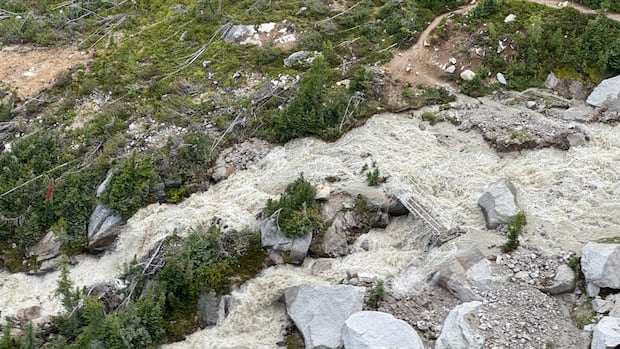The most significant legislation from Ontario’s Progressive Conservatives since winning their third straight majority is a sweeping bill that Premier Doug Ford says will protect the economy from tariffs, but which critics say will gut environmental protection.
Bill 5, also known as the Protect Ontario by Unleashing our Economy Act, is making its way through Queen’s Park and could become law before the legislature breaks for the summer on June 5.
The Ford government’s public justification for the bill is making major infrastructure and resource extraction projects happen faster by reducing delays and eliminating duplication in the approval process.
The PCs are framing the bill as an urgent response to the economic threats posed by U.S. President Donald Trump and his tariffs. Critics are calling that a pretext to loosen oversight of how companies operate in Ontario
Concerns are coming not just from Ford’s usual opponents — such as First Nations leaders and environmental groups — but also from organizations as varied as the Canadian Civil Liberties Association (CCLA) and the Toronto Zoo.
The Ontario government’s bill aimed at fast-tracking approvals of resource and infrastructure projects is facing scrutiny at Queen’s Park. As CBC’s Mike Crawley reports, Bill 5 has been criticized by environmental groups and Indigenous leaders for its proposed changes to the province’s endangered species and environmental protection laws.
The bill would make so many changes to provincial legislation that it’s worth having a guide to all its key provisions.
Here’s what you need to know about Bill 5.
Creating ‘special economic zones’
One part of Bill 5 would create a new provincial law called the Special Economic Zones Act. It’s arguably the most powerful section of the bill.
It would give cabinet the authority to designate any location in Ontario a special economic zone, where the government can exempt companies or projects from complying with provincial laws or regulations.

The CCLA calls the legislation a power grab that should only happen in times of public emergencies.
“This alarming move enables the executive branch of the government to unilaterally do away with legal safeguards that protect vulnerable communities and Indigenous people, paving the way for corporations to bypass labour and environmental laws,” Anaïs Bussières McNicoll, a director with the CCLA, said in a statement.
Ford has specifically said the Ring of Fire mineral deposit in northern Ontario and his proposed tunnel under Highway 401 are both candidates for special economic zone status.
The legislation contains no limits on where a special economic zone could be located. It gives cabinet the full power to designate a project as qualifying, and does not spell out any criteria for deciding which projects get the special status.
Prime Minister Justin Trudeau says he believes U.S. President Donald Trump’s repeated threats to annex Canada are in part because of his desire to control its critical minerals. Andrew Chang explains why they’re so attractive to the U.S., and how China is raising the stakes.
Changing endangered species law
Bill 5 would scrap Ontario’s Endangered Species Act and replace it with an entirely new law called the Species Protection Act, which critics say waters down protections.
The most significant provisions: changing the definition of a habitat so protection would only apply to an area immediately around an animal’s den or nest, and empowering the government to overrule the province’s independent scientific committee that classifies species as endangered or threatened.
The government calls this a “new approach” to protecting wildlife, plants and other species, and justifies the changes on the basis of efficiency.
“The current approach to the protection and conservation of species at risk is complicated, takes too long to complete, and causes unnecessary delays and costs for housing, transit, and critical infrastructure,” says a provincial government post explaining the bill.
More than 100 conservation groups have written a joint letter to the Environment Minister Todd McCarthy calling the proposed changes egregious.
“This bill, if passed, could undo decades of conservation efforts and threaten some of Ontario’s most vulnerable species,” added Dolf DeJong, chief executive of the Toronto Zoo, during a legislative committee hearing at Queen’s Park on Thursday.

“The environment must be protected, but so too must the economic interests of the province,” Energy and Mines Minister Stephen Lecce told the hearing. “Some will try to make it seem like you’ve got to pick a lane. We pick both.”
Fast-tracking mining projects
In addition to the potential to fast-track any resource or infrastructure project by designating it a special economic zones, Bill 5 also aims specifically to speed up approvals of mining projects.
The legislation enables the province to create a fast-track system for authorizing mining permits. Lecce says this will cut two years off the government’s current four-year timeline for approving mines to begin construction and operation.
“That is a significant reduction. It will be amongst the fastest permitting regimes in the industrialized democratic world,” Lecce told a news conference last week.
Cynthia Fiddler, a councillor of Sandy Lake First Nation, was one of several Indigenous leaders who spoke out against Bill 5 during a legislative committee hearing last week.
“This is wrong. This bill, this fast-tracking, that’s not what we want. We want to protect our land,” Fiddler said.
She described the legacy of a long-closed mine in her First Nation’s traditional territory.
“The air smells dead, the vegetation is not nice and this is something we have been asking for this government to clean up for years,” Fiddler said. “Fast-track that. Fast-track the clean up.”

Fast-tracking a landfill
Bill 5 would also green-light a proposed expansion of a waste-disposal facility at the edge of the town of Dresden in southwestern Ontario without an environmental assessment.
The landfill plan, pitched by York1 Environmental Waste Solutions Ltd., is facing widespread local opposition, including from one of Ford’s own MPPs.
Steve Pinsonneault, re-elected in February for the PCs in the riding of Lambton-Kent-Middlesex, posted a statement this week, saying he is angry and frustrated about the project and does not support the government’s legislation pushing it through.
Darrin Canniff, the mayor of Chatham-Kent, which includes Dresden, brandished an enlarged aerial photo when presenting to the legislative committee at Queen’s Park to show just how close the site is to the centre of the small town.
“If a massive landfill can be forced on our town without a full environmental review, whose town is next?” Canniff said.
The government’s rationale for the move centres on the fact that 40 per cent of waste generated by Ontario businesses is sent to landfills in the U.S.
A Conservative MPP is speaking out against the proposed Dresden landfill, all while the premier is working to fast-track the process.
CBC’s Katerina Georgieva reports.
“With the continued threats of border interruptions and tariffs, we can no longer afford to depend on the U.S. for this critical function, which is why we are building the capacity we need here at home, quickly,” says a background document provided by the government.
More Bill 5: Ontario Place, archeological assessments
Other notable provisions in the bill would:
- Exempt the province from providing public notice of any changes to the Ontario Place redevelopment project.
- Allow cabinet to exempt any property from a requirement for an archeological assessment under the Ontario Heritage Act.
- Prohibit lawsuits against the province related to various provisions in Bill 5, including the designation of special economic zones.
The bill would also enable cabinet to prohibit a foreign jurisdiction from having a financial stake in the province’s electricity sector and allow the province to revoke mining claims to protect the supply of critical minerals.
Ford’s PCs promised those measures during the election campaign and signalled that China is the chief target. However, party officials could not provide any examples of Chinese companies currently operating in Ontario’s electricity or mining sectors.








